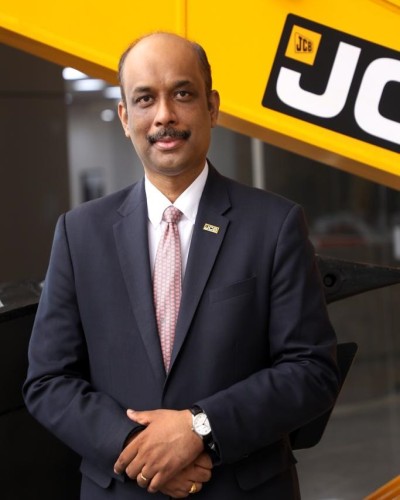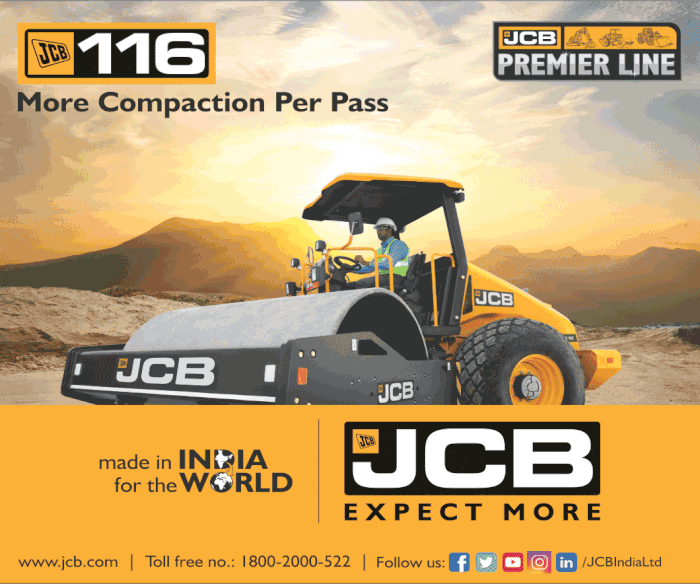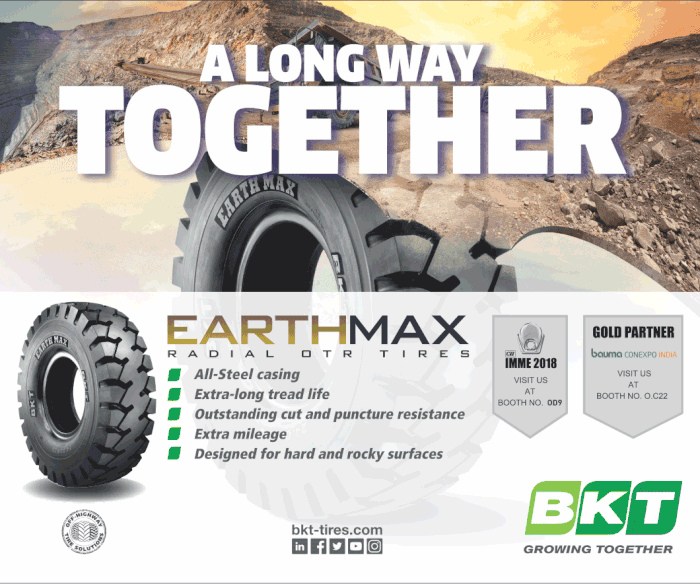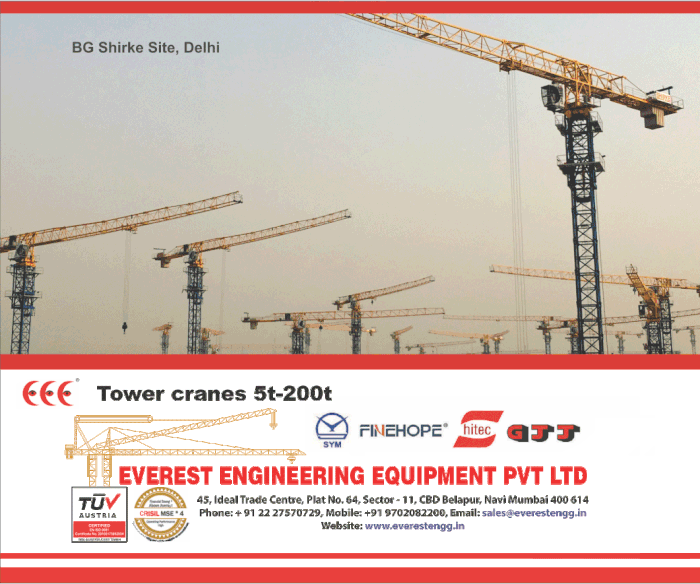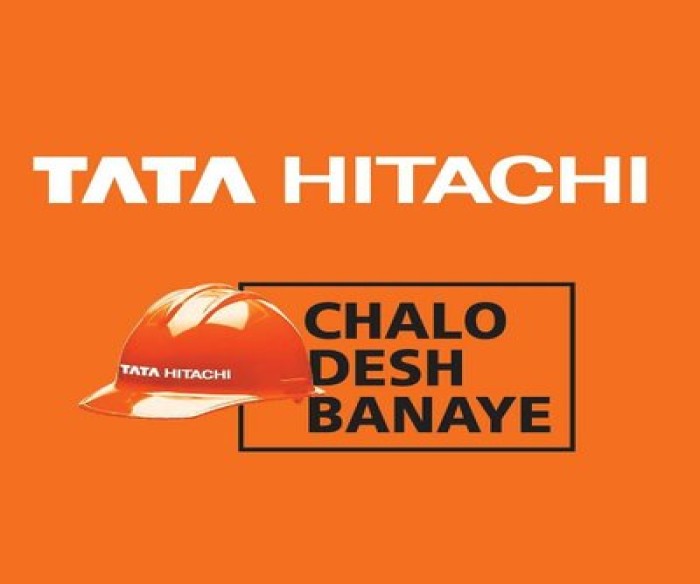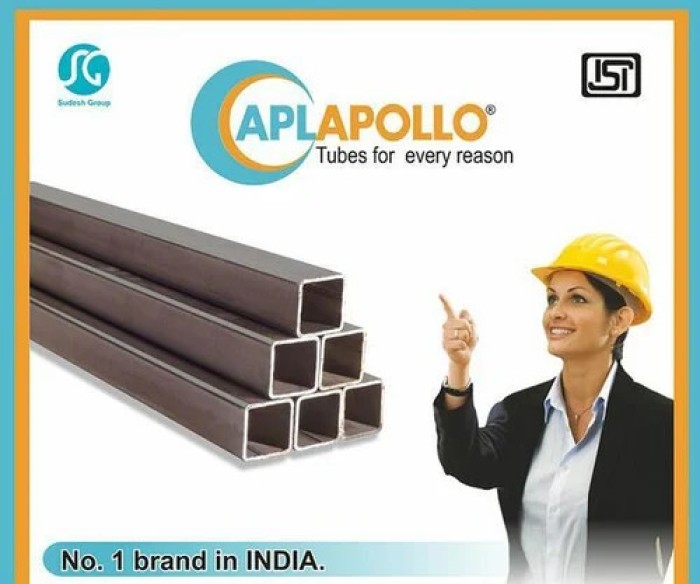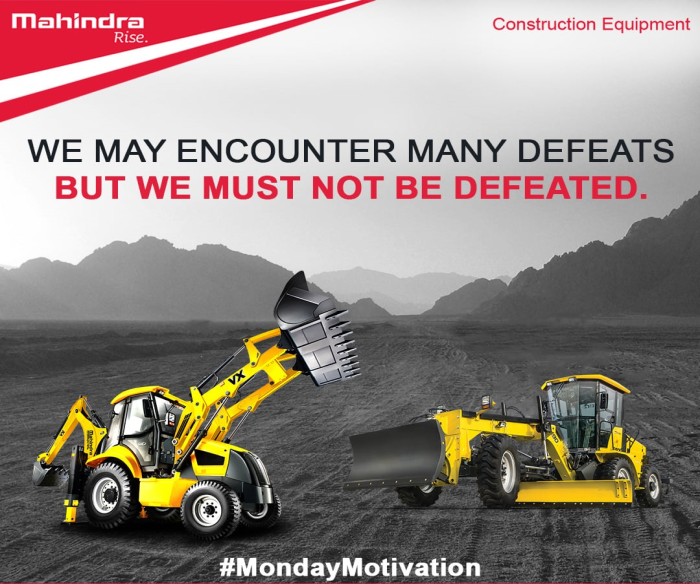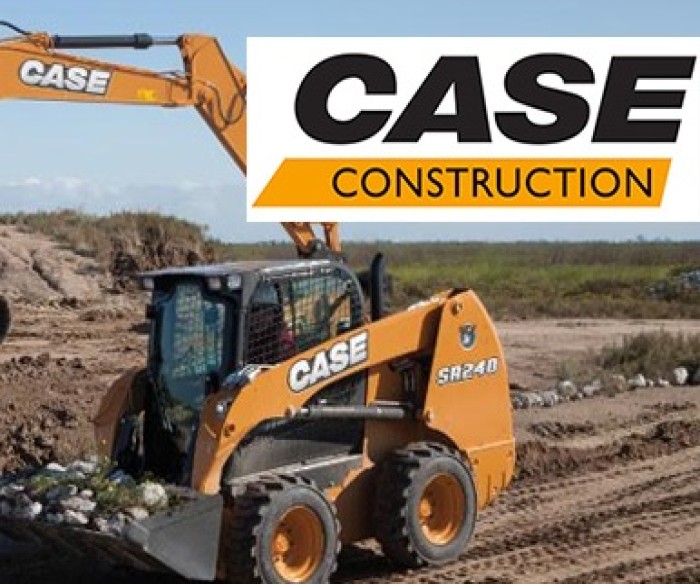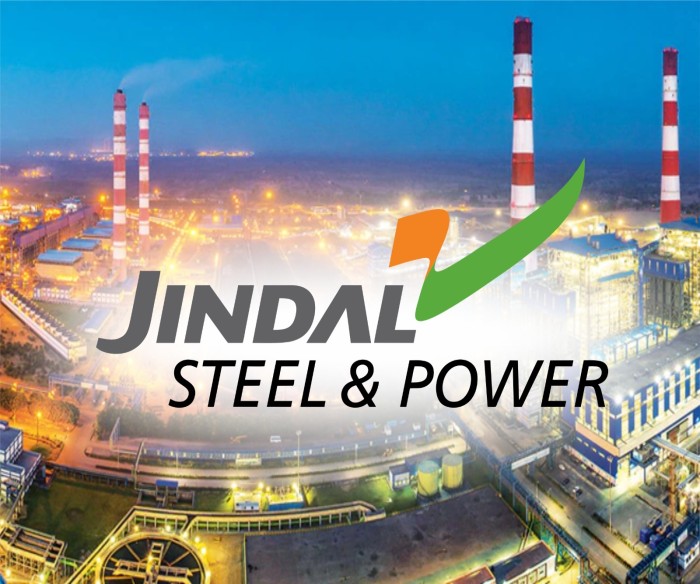"India is today an Economic power. At a Global level, it is playing a critical role in the China Plus strategy. The recent focus on Manufacturing lead growth through the vision of an Atma Nirbhar Bharat is opening up newer sectors for us. However, for us to success we need to be competitive and invest in the business."
Q. How do you foresee future trends and growth prospects for the Construction Equipment industry, particularly in 2024 and beyond, considering the upcoming general election and BSV emission standards for wheeled equipment?
The Earthmoving and Construction equipment industry has experienced strong growth this year, with estimates suggesting that this calendar year will be about 25% higher than 2022. This growth is attributed to the Government’s strong intent towards Infrastructure Development, and it is evident through initiatives like the National Infrastructure Pipeline and the Gati Shakti Programme. Projects such as the Bharat Mala, Sagar Mala, new Airports and massive focus on Railways are driving this industry. This is expected to continue for many years in the future as well. Although elections may cause temporary disruptions, the overall trajectory for Infrastructure development remains upward. Elections are an important part of a thriving democracy and are thus important. However, the CEV Stage V Emission Standards are anticipated to be a game-changer. While JCB is supporting Emission Control and Sustainability, we believe the industry needs more time for the effective execution of these stringent norms. As an industry, we have requested our Ministry (MoRTH) through ICEMA, to reconsider timelines. This would also be beneficial for the Supply Chain partners for their readiness and our Customers as they would need some time for Technology absorption.
Q. To ‘Build India for a New World’ with a focus on competitiveness, growth, technology, and energy efficiency, how do your products address sustainability, productivity, and the low cost of operation?
India is today an Economic power. At a Global level, it is playing a critical role in the China Plus strategy. The recent focus on Manufacturing lead growth through the vision of an Atma Nirbhar Bharat is opening up newer sectors for us. However, for us to success we need to be competitive and invest in the business. The Earthmoving and Construction equipment industry has also seen a strong performance in exports. JCB today proudly exports “Made in India” machines to over 130 countries around the world. We have seen a nearly 300% increase in exports. The acceptability of these machines the world over is only because they are high on technology, are energy efficient and our manufactured sustainably. We are very proud that India is the Global manufacturing hub for two of our product categories, Compactors and the Access range of machines. This is also attributed to our commitment to Global quality, a prerequisite for competing on the world stage.
To achieve this, the entire value chain, including Supplier Partners, must operate with a similar commitment. Sustainability is a significant focus, with investments over the years to reduce fuel consumption and explore alternative fuels. The Construction Equipment industry plays a critical role in Infrastructure development. As the spectre of climate change looms large and resource scarcity becomes a reality, the clarion call for sustainability grows ever louder. To address these demands, the industry is embracing a paradigm shift. Innovation is at the forefront, driving the development of cleaner, more energy-efficient machinery. Energy efficiency and real-time Equipment monitoring are becoming increasingly prevalent, reducing the carbon footprint of Construction projects. From optimising fuel efficiency to harnessing renewable energy sources, the industry is pioneering solutions that resonate with the collective imperative for a greener tomorrow. A recent report by Delloite-Shell indicates that Construction accounts for 37% of global Co2 emissions of which 16% represent embodied carbon, that is carbon dioxide coming from material sourcing and manufacturing, logistics, and Construction activities. Sustainability is reflective even in our product strategy, JCB introduced the industry’s first Electric Excavator and the PNG Genset at the last Excon. In 2020 we also introduced the world’s first dual-fuel CNG Backhoe Loader.
Q. What recent advancements, research and development have you undertaken in your machinery to enhance their performance, mobility on-site, ease of operation, minimise operator fatigue, reduce downtime, and lower maintenance requirements/ cost?
JCB machines are a result of constant Innovation. We have seen a significant Digital influx in the past few years. Our advanced telematics technology, Livelink, allows customers to monitor their fleet in real-time, exercising control over service, operations, and equipment security. This technology also enables JCB and our Dealers to monitor customer machines, facilitating preventive and predictive maintenance with real-time alerts on critical parameters. A special focus has been given to Operators in our range of our machines. Ergonomics is a key factor while designing equipment, as a comfortable operator would also be a productive and safe operator. We introduced Access Platform Machines in the domestic Market to bring in safety while working at heights. JCB Telehandlers with their high standard safety benchmark are also safer in comparison to pick and carry cranes. Our Design Centre in Pune has over 800 engineers, who work on various aspects of design and engineering. The facility works on domestic and global projects that give worldclass innovative products for our customers not only in India but also around the world. Through innovation, we are continually improving fuel efficiency, and our reducing the operating costs for our Customers, thus improving their Profitability.
Q. Additionally, to what extent does JCB leverage automation and robotic technologies in its equipment offerings to enhance productivity, efficiency, and overall performance in the Indian market?
Digital technology, Industry 4.0 or Automation is fundamentally changing how we are operating our factories. Manufacturers are responding by transforming their sites into safe and nurturing environments. Enhanced safety protocols, worker training programs, and equitable compensation are becoming standard practices. JCB aligns its operations with Industry 4.0 practices, investing in state-of-the-art manufacturing processes, including Robotic welding and a Robotic paint shop. This commitment to technology ensures customers receive Global products in India, exported to over 130 countries, including developed markets like the USA, Australia, and Japan.
Q. Decarbonisation is a top priority for responsible OEMs today. What specific research and development efforts is your company engaged in within this field? Furthermore, do you believe that electrification is a commercially viable solution for CE and can help achieve significant carbon reductions in the construction sector in the coming decades?
JCB leads the industry in decarbonisation, with significant investments in Hydrogen-powered machines operating satisfactorily in the UK. While Diesel technology is expected to continue for a few more years, we’ve pioneered the introduction of CNG-powered dual-fuel Backhoes and launched the industry’s first Electric excavator in India during last year’s Excon. While Electric technology might be suitable for smaller machines, for larger machines JCB is committed to Hydrogen technology. It is widely considered to be the fuel of the future. At a group level in the UK, JCB has developed its Hydrogen powered Internal Combustion Engine. While it is still early days, the future of Hydrogen, especially green Hydrogen is very bright in India obviously because of abundant sunshine and the Government’s push on the overall ecosystem.
Q. How does JCB maintain a balance when contending with low-cost OEMs offering competitively priced, basic technology excavators, while also facing high-tech multinational manufacturers in the heavier tonnage segment? Given that the 20-ton class represents 70% of the excavator market, how does JCB effectively compete in both realms, maintaining technological prowess in the heavier category and ensuring cost competitiveness in the 20-ton class segment?
All customers are important to us, and we strive to offer suitable products for their specific needs. With almost 15 different types of excavators, ranging from basic mechanical models to highfeature larger excavators, we meet diverse customer aspirations. The 20-ton range, representing the largest segment, includes the JCB205, JCB215, JCB 220, and the newly launched JCB225, ensuring a balance between technological prowess and cost competitiveness. We’ve also introduced machines in the 30-ton segment, such as the 345 and 385.
JCB machines have always been known for their performance and reliability. Our customers have placed their trust in us irrespective of which product they buy. Thus, for every product category we have different types of machines. The equipment is built to the same quality standards irrespective of what specifications our customers choose to purchase.
Q. In remote Infrastructure projects or mining areas where excavators often operate for extended periods of over 20 hours a day, machine availability becomes crucial. How does JCB ensure maximum machine uptime and availability of both spare parts and service support to meet the demands of such projects?
One of the leading differentiators is our product support network, with over 700 outlets across India. Our dealers, collectively employing almost 8,500 engineers, ensure professional product support. Continuous interaction and monitoring through our telematics system, LiveLink, assist in providing professional support, with five different parts warehouses across India ensuring stocked parts for dealerships. With projects of national importance gaining momentum, projects are getting executed in record time. Our customers invest in the JCB brand because they are aware that as an organisation, we will be able to provide world class product support. Our dealerships are spread across India, therefore whether it is having service vans, or having the right manpower or parts stock, our customers are never far away from professional product support. JCB prides itself on over 90% parts availability, which provides for efficient uptime.
Q. What value additions are you making to enhance your brand’s value?
Over the years, JCB has continuously elevated its brand’s value through a relentless commitment to innovation, reliability, and performance. JCB came to India in 1979 and has since remained customer-centric in its approach. Today, almost every job site in India today would have a JCB machine working tirelessly. Our products undergo rigorous advancements, integrating cutting-edge technologies to ensure they not only meet but exceed industry standards. By consistently pushing the boundaries of Engineering, we enhance the user experience, delivering machinery that is not just dependable but sets benchmarks in efficiency and durability. Additionally, our focus on customer feedback and evolving market needs enables us to introduce features that align with contemporary expectations, reinforcing JCB’s position as a trusted and forward-thinking brand in the construction equipment industry.
Q. What’s new at Excon?
Excon is known as the festival of the Construction and Earthmoving industry, providing an opportunity for manufacturers to showcase products and services under one roof. As always, this time, JCB will showcase a range of groundbreaking solutions, including stateof-the-art products, a strong focus on alternate fuels, and dedicated areas for finance and parts, offering stakeholders a comprehensive experience. We will also showcase a product, which will be ‘Asia’s First’ in its category. We look forward to having you visit the JCB pavilion at Excon.



